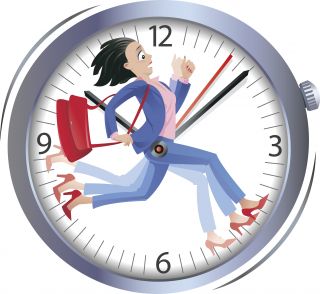Stress
Too Busy to Read This? Then You Probably Should: Part II
Warning signs of too much stress in your life
Posted August 20, 2012

Inevitably, when I talk with burnout victims and we go back over their lives to see what got them to that point, we find there were always warning signs. Some that they missed. Some that they saw and decided to ignore. But they were definitely always there, usually flashing brightly, but often ignored.
In this second part of Too Busy to Read This? Then You Probably Should, you'll learn the most common signs of too much stress—physical, behavioral, and psychological.
Physical Signals of Stress
Just as a car sends out warning signals to its driver when it's moving too fast, our bodies often provide the first cues to us that our stress levels are too high. This is because from a physiological perspective our bodies are the first to experience the stress. When stress throws us off balance physically, our bodies react with signals to let us know that something is wrong.
The problem is that most of us ignore these signals and continue to go about our busy lives. In fact, we're quick to find reasons to "prove" that the signals we're receiving from our bodies aren't serious. We say things like, "Oh, I just didn't sleep well last night, that's all. I'll be fine tomorrow." Or "It's probably just something I ate." That's why it's important to know the most commonly reported physical symptoms associated with stress so that when they appear in your life, you'll recognize them and take action.
- Fatigue: One of the first physical signs of stress that appears is fatigue. In fact, according to a survey conducted by the American Psychological Association (APA), thirty-five percent of women (and twenty-five percent of men) report experiencing fatigue several times a week. But because fatigue is so common these days and because it's not thought of as "serious," it's often ignored as a symptom of stress.
- Sleep Problems: Closely related to fatigue are sleep problems. According to a recent study conducted by the National Sleep Foundation, sixty-seven percent of women experience sleep problems at least a few nights a week, and forty-three percent say that daytime sleepiness interferes in their daily activities. Yet, few are going to bed earlier. Over two-thirds of the women studied associated their sleep problems with stress, yet when pressed for time, over half reported that sleep is the first thing they give up.
- Chest Pain or Heart Palpitations: Chest pain is obviously not unique to stress. However, if there is no evidence of heart disease or other physical conditions as the cause, the most likely culprit is stress. In fact, when you understand the body's physiological response to stress (the fight or flight response described in Part I of this series), chest pain should not come as a surprise. Physically, our bodies respond with a flood of adrenaline into our blood stream, the tightening of the chest muscles, increased respiration, and increased blood flow to the heart.
- Headaches: Headaches are one of the most common symptoms of stress, especially in women. According to the APA poll previously referenced, women are much more likely to report headaches linked to stress than are men (fifty-six percent versus thirty-six percent). Tension headaches are commonly linked to stress. However, some research suggests that migraines may be linked as well. A survey conducted by the American Headache Society found that the triggers most commonly cited by migraine sufferers were physical and emotional stress.
- Lightheadedness: Whenever heart rate and blood pressure rise or drop quickly, it can cause a feeling of lightheadedness. Like chest pain, it should be medically evaluated since it may be a sign of an underlying medical condition, but since heart rate and blood pressure are directly affected by stress, dizziness and lightheadedness are commonly reported by those who experience chronic stress.
- Gastrointestinal Discomfort: In part, because our physiological reaction to stress results in resources being diverted away from the digestive system, prolonged stress can lead to a variety of gastrointestinal problems. Commonly reported symptoms include indigestion, stomachaches, stomach cramps, nausea, constipation, and diarrhea. In addition, although medical conditions such as Irritable Bowel Syndrome and Ulcerative Colitis are not believed to be caused by stress, stress is believed to exacerbate these conditions.
- Gynecological Problems: Numerous studies have found a link between stress and female infertility. In fact, Dr. Sarah Berga, a reproductive endocrinologist at Emory University, has discovered that high levels of stress hormone prevent ovulation and therefore conception. Her most recent study, funded by the National Institutes for Health (NIH), found that those most at risk are women who demand too much of themselves. Although few of the women in Dr. Berga's study reported experiencing stress, she believes this is because many high-achieving women are not aware of how stressed they really are. She explains, "Just asking women if they are stressed doesn't always lead to an accurate answer, in part because some people are not aware of how stressed they are. Often it is those around them who know best." She believes that women often have unrealistic attitudes about themselves and others, and "think they can get more done in the day than is realistic, which causes them to feel as if they are underperforming even when they are not." Menstrual irregularities, such as amenorrhea and endometriosis, also have been linked to stress.
Behavioral Signals of Stress
Stress not only negatively impacts our bodies, it also can dramatically affect how we interact with and react to our environment. In fact, one of the first indicators that someone is stressed to other people is the behavioral changes they see. Many people become defensive when a family member or friend mentions these kinds of changes. But it's important to listen with an open mind to their comments. They may not always be right about what they're "seeing," but you may not always be right either.
Let's take a look at the most common behavioral changes associated with stress.
- Change in Eating Patterns: Stress can impact eating patterns in two ways, both of which can have significant psychological and physical consequences for women. In fact, one of the most common ways women respond to stress is through overeating, also called comfort eating. This can lead to dangerous medical problems, including weight gain and obesity, as well as feelings of embarrassment, guilt, and shame. But stress can cause the opposite to occur as well. Many women report a loss of appetite during periods of stress. They just don't "feel" like eating, which in the short-term deprives cells of the calories they need to supply energy to their bodies, and in the long-term weakens their immune system. Eating disorders, such as anorexia and bulimia, also are believed to have strong links to stress. Dr. Jacalyn Robert-McComb, a professor of exercise physiology at Texas Tech University and an expert on the physiological aspects of stress, reports that research has consistently found that females with eating disorders report higher levels of stress in their lives than those without eating disorders.
- Increase in Drug or Alcohol Use: In an attempt to deal with stress and the symptoms commonly associated with it, such as insomnia and depression, many people turn to alcohol and drugs, including caffeine, tobacco, and prescription medication. Many, in fact, need excessive amounts of caffeine just to make it through their day, and some turn to "uppers" to get through. On the other end of the spectrum, "downers" such as alcohol or sleeping pills, are often used to help overstressed individuals fall asleep or temporarily escape the harsh realities of their lives.
- Hyperemotionality: One of the most obvious signs of stress is a dramatic change in mood. These mood changes can come in many different forms. Uncharacteristic outbursts, impatience, and a shortened temper can often lead to tension in personal and professional relationships. Equally troublesome are periods of excessive crying, fidgetiness, or excessive nervousness.
- Poor Concentration/Attention and Forgetfulness: Memory problems and difficulty focusing and concentrating are commonly reported symptoms of stress. Jumping from one task to another, not finishing projects, and having to repeatedly ask for directions/explanations are all ways stress can be manifested behaviorally. These symptoms are often the direct result of fatigue and loss of sleep, which can become a vicious cycle for many as their performance and productivity suffer, which, in turn, increases their stress.
- Loss of Interest: Loss of interest in activities or people that were once important is a common symptom of depression, but can be brought on by stress. The behavioral manifestations may include not wanting to go to work, not wanting to spend time with family or friends, loss of interest in sex, or not wanting to do activities that once were enjoyable, such as sports, going to movies, or going on vacations. Other signs of loss of interest that often are seen in the workplace are procrastination, increased absenteeism, chronic tardiness, and not returning emails or phone calls.
- Isolation: Isolation is often a consequence of losing interest in people and life in general. It can take the form of wanting to be alone, closing doors to prevent others from access, being generally inaccessible, always eating lunch alone, not returning emails or phone calls, or being a poor team player.
- Increase in Nervous Habits: Stress is often reflected by an increase in nervous habits. Nail biting, teeth grinding, fidgeting, hair pulling, foot tapping, leg shaking, hair twisting, and lip biting are all common example of nervous habits sometimes brought on by stress.
Psychological Signals of Stress
Just about any psychological symptom known to the field of psychology can be a sign a stress. However, there are a few symptoms that are most commonly linked to it:
- Depression: Depression is one of the most commonly diagnosed problems in America. It affects millions of people each year, and it's particularly problematic for women. According to an APA report, Summit on Women and Depression, women are more than twice as likely as men to suffer from a major depressive episode in their lifetime. Although there are many things that can cause depression, life stress is certainly one of them. According to the APA, more than eighty percent of community cases of major depression were preceded by a stressful life event.
- Anxiety and Worry: Anxiety and worry are classic signs of stress. Symptoms of clinical generalized anxiety can include restlessness, fatigue, sleep problems, concentration and attention problems, irritability, and physical symptoms such as headaches, muscle tension, or shortness of breath.
- Feelings of Hopelessness and Helplessness: When stressful events continue to happen in our lives with little opportunity for relief, a common reaction is to feel helpless and hopeless. In high-achieving women, these feelings are often brought on by a sense that regardless of what they do or how hard they try, the stress continues. These feelings coupled with the sense of loss of control are commonly cited precursors to burnout.
HOW MUCH IS TOO MUCH
Because of the serious consequences, it's important to be aware of these common signs and symptoms of stress. However, how much stress is "too much" stress is hard to say. Because people have different personalities, life experiences, thresholds, and mediators for stress, there is no magic number of "signals" that will tell you if your stress level has exceeded your body's capacity to handle it.
Of course, common sense says that the more symptoms you have, the worse your stress is and the more dangerous it is to your physical and psychological health. And I agree with that to some extent. But a word of caution about relying too heavily on numbers: they can be misleading at times. Who is to say that someone who suffers from debilitating headaches due to the incessant, unyielding stress is any less stressed than someone who experiences ten of the symptoms in a milder form?
The key is to be well-informed and aware. By simply knowing what to look for, you're in a much better position to recognize when stress has gotten to the point where it is interfering in your ability to be productive, and more importantly to enjoy your life.
© 2012 Sherrie Bourg Carter, All Rights Reserved
Follow Dr. Bourg Carter on Facebook, Twitter, and Amazon's Author Page.

Sherrie Bourg Carter is the author of High Octane Women: How Superachievers Can Avoid Burnout (Prometheus Books, 2011).




